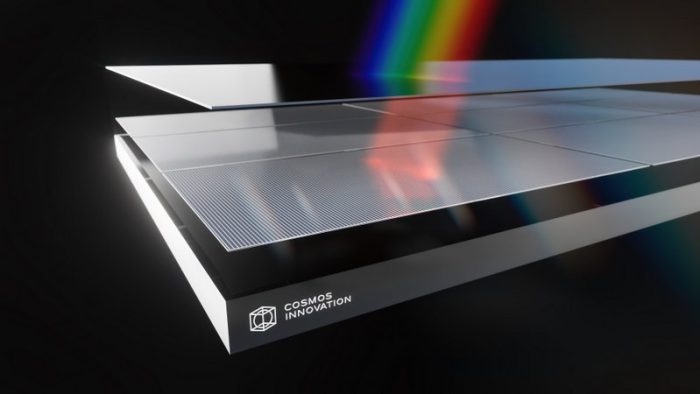
Perovskite solar cells are tantalizing for how much more efficient they could be versus silicon solar cells. The problem is stabilizing these cells for real world conditions and scaling the tech to be commercially viable for larger-scale solar applications.
We have noted many lab breakthroughs touted here and there over the years, and many solar module players are researching new tandem solutions that adds a perovskite to a silicon solar cell base. First Solar is one an example of a larger PV producer that us acquiring perovskite tech and working on what’s next.
Still though, progress here is slow. Can artificial intelligence (AI) help speed things up in the road map to develop next-generation solar PV technology?
Cosmos Innovation and the investors behind its recent $19.7 million in funding think so. Cosmos Innovation says it is an “AI-first company building next-generation perovskite silicon tandem (PST) solar cell technology,” with a fundamentally different approach. This approach eschews the historically manual, trial-and-error-based development process for semiconductors by using AI to optimize and speed up the experimental design, test and iterate loop.
Founded in 2022, Cosmos Innovation is bringing together leading experts in AI, semiconductors and solar to give the company a distinct market advantage. Founders Vijay Chandrasekhar and Joel Li, the company’s CTO, have academic and professional careers at the intersection of these three fields, each with deep expertise leading specialized engineering teams at major research institutes.
“Mainstream silicon solar technology is reaching its technological limits. Our innovative AI process optimization platform enables us to accelerate the once-in-a-lifetime platform shift to perovskite silicon tandem technology in the solar industry,” said Vijay Chandrasekhar, CEO and co-founder, Cosmos Innovation.
Ultimately, Cosmos Innovation plans to construction of the world’s first self-learning fab in the solar and semiconductor space. The technology underpinning this plan is Mobius, an “AI recipe optimization platform,” that the company has demoed in various sectors, including solar, silicon carbide, advanced data center chips and advanced packaging.
Perovskite problems | Back to the fundamental challenges of perovskite. To this point: “the multilayer architecture leads to innumerable variations of possible design, making it time consuming and expensive to achieve the optimal recipe for peak cell efficiency and stability,” the Cosmos team says.
Mobius works to finely tune those recipes and discover a combination of materials, processes and architectures that yields the most efficient solar cells in a fraction of the time and at a fraction of the cost of conventional methods.
Cosmos Innovation says Mobius has demonstrated a 10x acceleration in process recipe development time.
“It does this by intelligently proposing the next set of materials and process conditions to run,” says Joel Li, CTO and Co-Founder, Cosmos Innovation. “We believe that Mobius will help us solve the last-mile challenges of perovskite silicon tandem solar cells and accelerate its commercialization.”
The Series A round was led by Xora Innovation, an early-stage, deep-tech investment platform of Temasek, a global investment company headquartered in Singapore. Other investors joining the round include Innovation Endeavors, which led the seed round; Two Sigma Ventures; DeepMind CEO Demis Hassabis; noted MIT professor Tomaso Poggio, a founder of computational neuroscience; Richard Socher, leading natural language processing (NLP) researcher, CEO of You.com and managing partner at AIX Ventures; and Western Technology Investments, one of the leading venture debt funds in Silicon Valley.
“The beauty of AI is its ability to positively surprise us – to reach for solutions that elude our human brains because of our biology and conditioning,” says Colin Beirne, Partner, Two Sigma Ventures. “AI thrives in situations of complexity and large parameter spaces – like semiconductor development. Cosmos Innovation is harnessing these capabilities, and building a tremendous team of experts, with a goal of reaching new heights in perovskite silicon tandem solar cell efficiency. We’re incredibly excited to support them on this valuable mission.”
— Solar Builder magazine
[source: https://solarbuildermag.com/news/can-ai-speed-tandem-solar-cell-development/]
Leave a Reply
You must be logged in to post a comment.